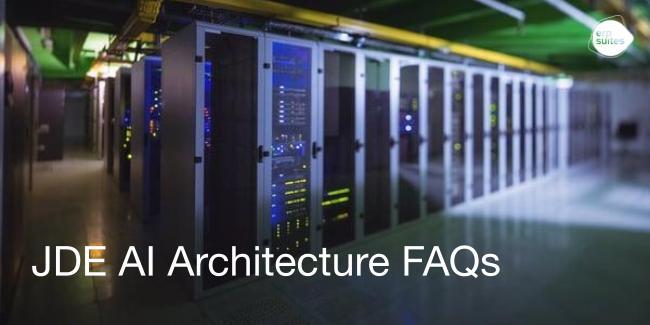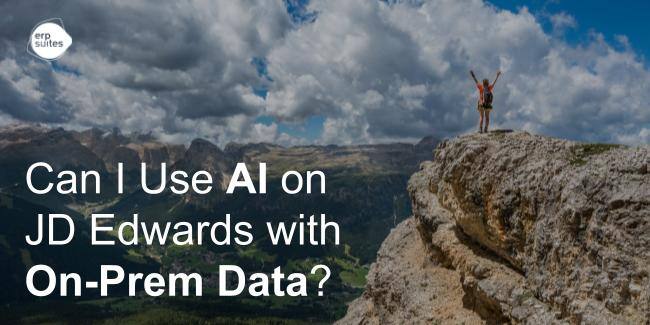8 Attributes to Look For in a Managed Services Provider
February 21st, 2024
4 min read
.png?width=960&height=540&name=Blog%20Images%20(27).png)
When it comes to reliably managing JD Edwards, businesses are interested in Managed Service Providers (MSPs) who can navigate the complexities of their ERP system. Selecting an MSP is a process that requires careful vetting and insight.
In this blog, we cover the top eight attributes to look for in a managed services provider.
What Managed Services Entails
Managed services refers to the practice of outsourcing certain business processes and functions to external providers, known as managed services providers (MSPs). In the JD Edwards context, these MSPs handle the management and operation of various aspects of a company’s JDE ERP system.
The primary typical duties of a JDE managed services provider can include IT services, security services, managed cloud services, hosting services, support, monitoring, recovery, and maintenance. The goal of utilizing a managed services provider is to enhance efficiency, reduce operational costs, and to allow the client to focus on their core business activities.
Some organizations may opt for full-time managed services, where the provider offers continuous and comprehensive support for their JD Edwards system. This could involve dedicated personnel assigned to monitor, manage, and optimize the software environment on an ongoing basis.
Other organizations may choose part-time managed services, where the provider offers support on a scheduled or as-needed basis. This could involve periodic check-ins, assistance with specific issues, or support during critical phases such as system upgrades.
The specific terms and conditions of the engagement are typically outlined in a service level agreement (SLA) or a contract between the managed services provider and the client. The choice between full-time or part-time support depends on the organization's requirements, budget considerations, and the complexity of their JD Edwards environment.
Key Considerations for MSP Excellence
To get the best bang for your MSP buck, there are several key factors to take into consideration. It is also important to remember that you need only to select the MSP who provides the factors you are most interested in. There is no need to purchase services you won’t use.
Customer Support
The establishment of a strong and open relationship between customer and MSP is critical. Both parties need to engage in ongoing conversations to be sure proactive advice is dispensed and taken. When the customer can trust in the MSP, and their ERP expertise, it makes it easier to take said advice, and to troubleshoot in the future.
Operational Excellence and Product Knowledge
Vital for JDE's size and complexity. Focus on seamless maintenance, including tool releases, logic patches, and package builds. A one-stop-shop approach for personalized and efficient service.
Flexibility and Customization
Every JD Edwards customer configures their system differently, based on their unique business needs, controls, and licensing. A good MSP understands these nuances and does not take a one-size-fits-all approach. They will respect each customer’s specific processes, permissions, and requirements.
Some overarching best practices for JD Edwards implementations do exist. For example, separating production and non-environments is beneficial for any customer, as it allows new code and upgrades to be tested without impacting production. Regularly performing system patches and updates to supported versions is also a standard typically in place for all customers.
Cost
Your MSP costs are dependent on a variety of factors, including primarily time. Typically, providers offer services on a bucket-of-hours model, with a set number of hours committed per month. This allows for proactive maintenance and relationship-building, in addition to reactive support.
Support that is on an as-needed basis is a less comprehensive (and less recommended) option, as it does not facilitate regular system care. Fixed annual plans that cover expected service needs are also common and allow for a comprehensive solution with room for additional needs.
Disaster Recovery and Business Continuity
It is important for providers to have a plan for keeping JD Edwards systems running in the event of a disaster or outage at the primary site.
Most customers implement disaster recovery by replicating their production environment to a secondary data center. The provider must have a playbook for switching over systems to the backup site seamlessly if needed. This process requires testing to work out any issues.
Many competitors may only understand disaster recovery at the application level, without considering infrastructure dependencies. Having one's own data centers or partnering with another group to provide the secondary site can complicate orchestrating a smooth failover process.
ERP Suites has both network engineering expertise and our own data centers. This allows them to better work through disaster recovery conversations and requirements from both an infrastructure and application perspective.
Innovation
In order to help clients innovate, it’s essential for your MSP’s own operations to continuously improve over time. An MSP that relies on outdated systems and processes is not going to be able to help you reach new goals.
It is also important for providers to be knowledgeable about newer JD Edwards features, like Orchestrator and UX One. Being familiar with the latest JD Edwards features enables MSPs to support customers in implementing and optimizing these technologies.
The provider should understand how JD Edwards integrates with the wider ecosystem, such as other Oracle products and cloud services. One such example is Oracle’s own recent launch of JDE on Oracle Cloud. Customers want a provider that can help JD Edwards environments evolve to keep up with innovations, such as best practices for deploying JD Edwards in cloud environments on OCI or AWS versus on-premises data centers. This is an area that rapidly changes over time.
Experience
Having a provider with a long history with JD Edwards allows the MSP to be aware of pain points within this complex system and know how to avoid issues. To remain innovative and keep expertise current for the customer, the MSP should continue to bring in new talent and retain experienced consultants.
Customers want a provider they can build a long-term, trusting relationship with and enjoy speaking to, even – perhaps especially – when issues and problems arise. Having both structure and flexibility in the relationship is essential. The MSP needs operational discipline but also the flexibility to work with any industry specifics or idiosyncrasies. The focus should be on resolving issues, instead of merely referring the customer to the stated terms and conditions in a contract.
Security
A good MSP will recommend and perform implementation of the right cybersecurity posture for their customers. Because of the established trust in the MSP-customer relationship, established above as a key component in the selection process, the MSP will be able to guide the customer to the best security practices with the full context of their company in mind.
A general best practice in JD Edwards security implementation is the separation of production and non-production environments. This allows customers to test new code and upgrades without impacting production. Appropriate redundancy across production components is also important for high availability. Systems should be regularly patched and updated to supported versions as well. The overall architecture should be designed to deliver business value through technologies like UX One and Orchestrations.
Making Your Choice
In conclusion, selecting the right MSP for your JDE needs involves careful consideration of these factors. It's not just about finding a provider; it's about forging a partnership that ensures your business operates seamlessly within the intricate world of JD Edwards.
If you’d like to see how ERP Suites can provide the best managed services for your team, drop us a line.
Leyla Shokoohe is an award-winning journalist with over a decade of experience, specializing in workplace and journalistic storytelling and marketing. As content manager at ERP Suites, she writes articles that help customers understand every step of their individual ERP journey.
Topics:



.png?width=650&height=325&name=Blog%20Images%202_1%20(4).png)
.png?width=650&height=325&name=Blog%20Images%202_1%20(5).png)
.png?width=650&height=325&name=Blog%20Images%202_1%20(3).png)
.png?width=650&height=325&name=Blog%20Images%202_1%20(2).png)
.png?width=650&height=325&name=Blog%20Images%202_1%20(1).png)
.png?width=960&height=540&name=Blog%20Images%20(96).png)

.png?width=960&height=540&name=Blog%20Images%20(90).png)
.png?width=960&height=540&name=Blog%20Images%20(88).png)
.png?width=960&height=540&name=Blog%20Images%20(87).png)
.png?width=960&height=540&name=Blog%20Images%20(86).png)
.png?width=960&height=540&name=Blog%20Images%20(85).png)
.png?width=960&height=540&name=Blog%20Images%20(83).png)
.png?width=960&height=540&name=Blog%20Images%20(82).png)